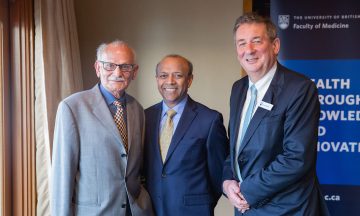The University of British Columbia and the University of Oxford have formalized a transatlantic partnership that will create a global network for training in clinical pharmacology.

(L to R): Dr. Sultan Karim, Professor John Climax, and Dr. Dermot Kelleher
UBC and Oxford have signed a memorandum of understanding to create a pathway for the exchange of people and ideas to accelerate growth in the field. The Sultan Karim Fellowship in Clinical Pharmacology established at UBC’s faculty of medicine forms part of this innovative strategy to involve more clinical pharmacologists in the early stages of drug development to assess drug efficacy.
Professor John Climax, an early champion of the field of clinical pharmacology, has been a driving force behind this initiative. In 2017, Professor Climax established a Chair of Clinical Therapeutics and a number of associated fellowships at St. Hilda’s College, University of Oxford. These fellowships will provide opportunities for early and mid-career clinical scientists to develop their expertise and practical experience in early phase clinical trials at Oxford. Professor Climax has now turned his attention to North America, creating a fellowship in honour of UBC clinical professor emeritus Dr. Sultan Karim, an eminent clinical pharmacologist who conducted seminal clinical research into the use of prostaglandins in obstetrics.
We have tremendous opportunity to accelerate the development of medications with the greatest potential to restore health.
Dermot Kelleher
dean, faculty of medicine and vice-president, health, UBC
According to Dr. Dermot Kelleher, dean, faculty of medicine and vice-president, health at UBC, the Sultan Karim Fellowship in Clinical Pharmacology is just the beginning for a discipline poised to reshape translational medicine.

(L to R:) Dr. Dermot Kelleher and Sir Gordon Duff
“We have tremendous opportunity to accelerate the development of medications with the greatest potential to restore health,” Dr. Kelleher said. “Clinical pharmacologists are uniquely positioned to guide this process and this partnership allows us to make real progress in developing the careers of people who can make a real difference.”
“It is our duty to address the full scope of health challenges that reduce life expectancy and quality of life worldwide,” said Sir Gordon Duff, principal of Oxford’s St. Hilda’s College, and pro-vice-chancellor in the University of Oxford. “I am pleased to witness an initiative that is drawing together talent from around the world to help translate important scientific advances more quickly into clinical treatments to benefit patients and families.”